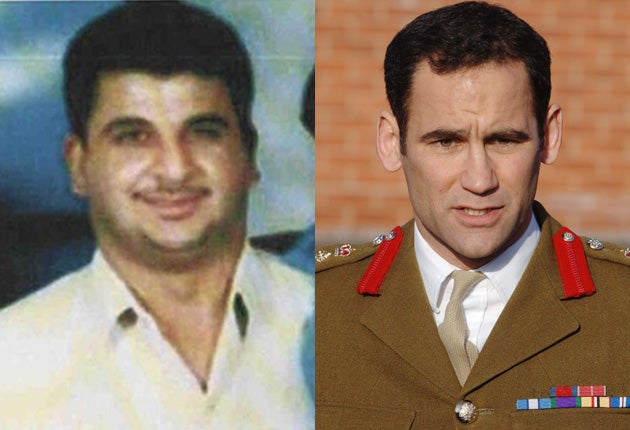Baha Mousa case: Colonel 'kept out of the loop'
Senior officer tells public inquiry into Iraqi's death that his subordinates let him down

A senior officer who faced a court martial over the death of the Iraqi prisoner Baha Mousa told a public inquiry yesterday that he accepted responsibility for what happened, but denied he had done anything wrong personally and blamed his subordinates for letting him down.
In his testimony into the death of the 26-year-old Iraqi hotel worker while in British custody, Colonel Jorge Mendonca said that junior officers had kept him "out of the loop" about the mistreatment, perhaps because of his "reputation for doing things properly".
However, Col Mendonca maintained that interrogation techniques banned by the British Government for 31 years were routinely used by UK forces in the aftermath of the 2003 invasion, and that this was acceptable practice.
Britain's security forces were ordered to stop techniques such as hooding and subjecting detainees to stress positions and sleep deprivation by the government of Edward Heath in 1972, following a case in which the European Court of Human Rights found their use in Northern Ireland to be inhumane.
But Col Mendonca, who commanded the 1st Battalion the Queen's Lancashire Regiment following the 2003 invasion, said the measures had been necessary to "stop the prisoners talking to each other" and for "stopping them from escaping". He claimed that these were "pragmatic and sensible means in the light of what was faced in Basra" at the time.
The officer added that although he felt keeping prisoners hooded or forcing them to stand for prolonged periods with their hands outstretched before them was justified, other forms of "conditioning" such as being forced to adopt a "skiing position" for hours was not.
Mr Mousa was killed with 93 injuries to his body while in the custody of British forces in Basra. Six soldiers, including Col Mendonca, were cleared by a court martial over the death. Another defendant, Corporal Donald Payne, the first member of British forces to plead guilty to war crimes charges, served a prison term. Last year the Ministry of Defence agreed to pay the Mousa family £2.8m in compensation.
Col Mendonca said he accepted overall responsibility for Mr Mousa's death as battalion commander but insisted he had no knowledge of the mistreatment the Iraqi hotel worker and his fellow prisoners had faced.
The officer left the Army seven months after his court martial while facing possible disciplinary charges. He complained he had been "hung out to dry" and made to feel like a "common criminal" by the defence hierarchy. Col Mendonca had been regarded as a promising young commander.
He rejected claims at the inquiry yesterday that his "gung-ho style of leadership" encouraged "a culture of casual violence" in his battalion.
He denied the allegation – one of a series of accounts by soldiers alleging their colleagues' abuse of Iraqi civilians – that he had punched a prisoner on the head and called him a "terrorist fucker" in front of 120 men and that he had cocked his pistol, held it in front of a detainee and threatened to "blow his face off". The officer said it was "completely untrue" that, while collecting his rifle one day, he had said: "Let's get some blood on the tracks."
Military witnesses have told the hearing they saw troops under Col Mendonca's command kicking a 12-year-old boy in the head for throwing a stone; a prisoner being left with a broken wrist and concussion after being assaulted; a sergeant boasting he had kicked another prisoner in the throat; a soldier who "had advanced knowledge of martial arts... coldly going about his job" in assaulting a prisoner; and officers instructing soldiers to attack other prisoners.
Col Mendonca's personal bodyguard was among those allegedly involved in the abuse. However, the officer said: "If soldiers [had been] beating up Iraqis around the city, I am sure I would have come across it.
"There may well have been things going on that I was unaware of, but my general impression of the tour was that the soldiers did an extremely good job and carried out my intent."
Col Mendonca added: "While what you show me is a shocking and disappointing and deeply embarrassing situation, it is not representative of the battalion on that operation. It is a slice of what went on clearly, but it's not representative of the whole battalion."
Timeline: The Baha Mousa case
*6 April 2003: British forces enter Iraq's second city, Basra.
*14 September 2003: Baha Mousa, 26, and nine others are arrested at Ibn al-Haitham hotel by the 1st Battalion, the Queen's Lancashire Regiment (QLR).
*16 September 2003: Mr Mousa dies in custody with multiple injuries.
*19 July 2005: Seven British soldiers are charged in connection with his death and abuse of Iraqi prisoners.
*19 September 2006: Corporal Donald Payne, 35, pleads guilty to inhumane treatment of Mr Mousa. The six others, including commanding officer Colonel Jorge Mendonca MBE, plead not guilty to their charges.
*13 March 2007: The court martial ends. All the other soldiers are cleared.
*30 April 2007: Payne is jailed for a year and dismissed from the army. He is cleared of manslaughter and perverting the course of justice.
*27 March 2008: The Ministry of Defence admits breaching Mr Mousa's human rights and those of eight other Iraqi men.
*14 May 2008: Defence Secretary Des Browne announces public inquiry to be held into Mr Mousa's death.
*10 July 2008: MoD agrees to pay £2.83m compensation to the mistreated detainees.
*13 July 2009: Public inquiry begins.
Subscribe to Independent Premium to bookmark this article
Want to bookmark your favourite articles and stories to read or reference later? Start your Independent Premium subscription today.

Join our commenting forum
Join thought-provoking conversations, follow other Independent readers and see their replies